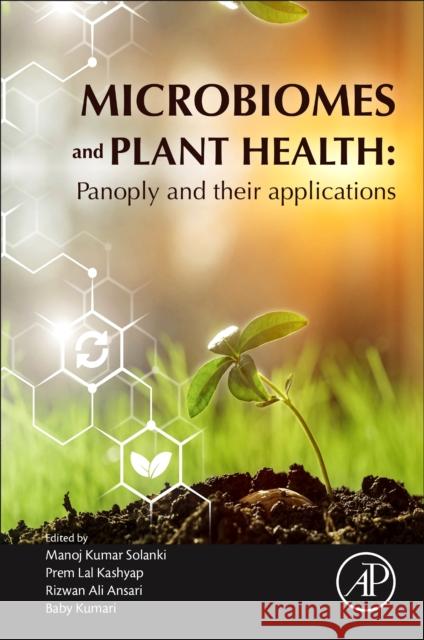Microbiomes and Plant Health: Panoply and Their Applications » książka



Microbiomes and Plant Health: Panoply and Their Applications
ISBN-13: 9780128197158 / Angielski / Miękka / 2020
Microbiomes and Plant Health: Panoply and Their Applications
ISBN-13: 9780128197158 / Angielski / Miękka / 2020
(netto: 730,84 VAT: 5%)
Najniższa cena z 30 dni: 759,55
ok. 16-18 dni roboczych.
Darmowa dostawa!
PART ONE: Introduction Part
1. Emerging insights on the potential role of plant-associatedmicroorganisms in sustainable agriculture
2. Application of cereal and vegetable endophytes in plant health management
3. Plant virome: current understanding, mechanisms, and role in phytobiome
PART TWO: Methodological Sections
4. Modern biotechnological tools: an opportunity to discover complex phytobiomes of horticulture crops
5. Genome mapping tools: current research and future prospects
PART III: Scientific chapters
6. Mycorrhizal fungi and its importance in plant health amelioration7. Sugarcane microbiome: role in sustainable production
8. Preface of phytobiome in nutrient recycling, biogeochemistry, and spatial dynamics
9. Maize microbiome: current insights for the sustainable agriculture
PART IV: General Sections
10. Phytobiomes and bioremediation
11. Modern era of microbial biotechnology: opportunities and future prospects
12. Phyllosphere microbiome: modern prospectus and application
13. Microbial linkages in the heavy metal remediation14. Actinobacteria interventions in plant and environment fitness15. Microbiomes in some cereal crops: diversity and their role in geochemical nutrient recycling
Manoj Kumar Solanki is currently employed as a scientist in the Institute of Biology,
Biotechnology, and Environment Protection of the Faculty of Natural Sciences at the
University of Silesia in Katowice, Poland. In 2006, he received his Master's degree in
Microbiology from Barkatullah University, and in 2013, he received his Ph.D. in Microbiology from Rani Durgawati University in India. He also served as a research associate in a DBTfunded project at the International Crops Research Institute for the Semi-Arid Tropics
(ICRISAT) in India. He received a visiting scientist fellowship from the Guangxi Academy of Agriculture Sciences in China from 2013 to 2015, as well as a visiting scientist fellowship from the Volcani Center, Agricultural Research Organization in Israel from 2016 to 2020. He has been involved in numerous research activities on plants-microbes interaction, soil microbiology, plant disease management, enzymology, and microbial genome analysis during his research career, and has published a number of publications in prestigious peer-reviewed international journals and books. He is also expanding his knowledge of agriculturally significant microorganisms, with a focus on soil and crop health management, among other things as well as worked as associate/guest editor for various journals and has sound expertise in editing books and reviewing articles.
Dr. Prem Lal Kashyap is a scientist (Plant Pathology) in ICAR-Indian Institute of Wheat and Barley Research, India. His research interest includes comparative genomics and population genetics of plant pathogens, microbial diversity, characterization and conservation, plant-microbe interactions, and microbial nanotechnology. Dr. Kashyap has more than seventy publications to his credit, including research papers and book chapters, and edited or authored several books. Dr. Kashyap has 8 years of research experience, and he has been awarded the NAAS Young Scientist Award (Plant Protection) (2015-16) and Dr. Basant Ram Vashisht Youth Vaigyanic Puruskar- 2014 (2015) by the Uttar Pradesh Academy of Agricultural Sciences (UPAAS), Uttar Pradesh, India. Dr. Rizwan Ali Ansari is currently working as an Assistant Professor at Aligarh Muslim University, Aligarh, India. His research interests center on the development of formulation through organic and bio-organic interactions so that sustainable agriculture could be intensified. He has received prestigious awards by various scientific societies, such as the Society for Plant Protection Sciences (SPSS) and Nematological Society of India (NSI) for his outstanding contribution in the field of Plant Pathology and Nematology. He has published many research articles, review articles, chapters, and books on organic matters, mycorrhizal fungi, plant growth promoting bacteria, bio-inoculants being utilized in the sustainable management of plant pathogens. Dr. Kumari obtained her Master's degree in Biotechnology from University of Rajasthan and the Ph.D. degree in Biotechnology from the Vinoba Bhave University (2017), Jharkhand, in collaboration with the Bhabha Atomic Research Centre, Mumbai, India. She has worked at the Bhabha Atomic Research Centre, Mumbai, Maharashtra, April 2013-April 2014, in Nuclear Agriculture and Plant Biotechnology Division. She also worked there in the Radiation and Health division. Dr. Kumari has a great interest in Plant Microbiome interactions, especially in medicinal plants.1997-2026 DolnySlask.com Agencja Internetowa
KrainaKsiazek.PL - Księgarnia Internetowa









